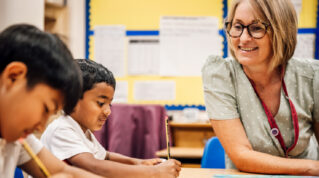Children can’t learn properly if they are struggling with poor mental health. It is often the root cause of behavioural problems and chronic absenteeism, all of which have risen since the pandemic. Breaking this cycle by improving pupil wellbeing is becoming a matter of urgency for schools.
In our Generation Catch-Up Report, we surveyed 500 school leaders who named mental health and wellbeing as the biggest factor that is affecting pupils’ learning. So what are schools doing to address this issue?
Manage anxiety
Schools have noted that low level pupil anxiety has increased which is having an impact on learning and attendance. To counteract the problem they are increasing their support in this area.
The start of the school day is one flashpoint of high anxiety across all ages. Older children benefit from breakfast clubs so they can start the day positively with friends. For younger pupils, being offered a quiet space to gently acclimatise to the school day is beneficial. This is the approach St Thomas More Catholic Primary has taken.
“We have a morning nurture group which is available for any child who has difficulty separating from parents when they arrive, and some children access this daily while others dip in and out of it,” says headteacher Donna Faley.
In secondary schools, encouraging students to discuss their worries can help them manage anxiety. Beacon Academy has brought in external help to widen its support in this area with professional counselling offered to students. Assistant headteacher Peter Hall explains why.
“Many young people are more nervous than they were before the pandemic. The positive thing is we are all more open to talking about it,” he says. “We run a counselling service here and at our sixth form site, and we buy in the services of an external charity. It’s important to be aware of the flashpoints when more people are anxious – for instance when deadlines are approaching, or tests and exams.”
Build social skills
Education does not happen in a vacuum and children need good social skills to forge the right environment for learning. The lack of opportunity to socialise during the pandemic is still having an impact on how children interact with each other. This has left schools in a position where they may need to help children build social skills appropriate for their age.
Secondary schools reported seeing social interactions in Y7 and Y8 that would normally be associated with primary school pupils. St Illtyd’s Catholic High School is addressing this by spending more time helping pupils manage relationships.
“There are a lot more tears, arguing and falling out than we would normally see,” says Ieuan Price, director of digital learning. “Staff are having to upskill to deal with this. They are putting aside time in the day to help pupils resolve their difficulties and helping them to learn how to deal with their emotions in these situations.”
Increase parent trust
Leaders report increased involvement from parents too, presumably a direct result of families having spent more time together during lockdown. When pupils lack the confidence to deal with everyday challenges parents naturally want to be more involved in the intricacies of their child’s school life. This can affect learning as children are unable to take responsibility for their own behaviour and achievement.
At Ysgol Aberconwy Secondary they have experienced parents contacting the school about issues they would have previously trusted the school to deal with, such as a change in maths set or a friendship issue.
Chris Kitchen, assistant head is working closely with parents to help children become more self-sufficient. “Where parents want this level of involvement we support them, but we also try to rebuild their trust in us by backing up the decisions we make with evidence and pupil data,” he says. “We work alongside parents with the ultimate aim of helping children become more independent.”
Leaders are embedding wellbeing as a natural part of children’s education so problems can be addressed before they become more serious. Long-term poor mental health can have a devastating impact on a child’s education.
Schools’ innovative wellbeing strategies are ensuring children want to be at school, building positive connections with their friends and teachers so they can fill the learning gaps left over from the pandemic. To see our data in full or examine the insight and gap-closing strategies from school leaders, download a complimentary copy of the Generation Catch-Up Report.
















Your thoughts